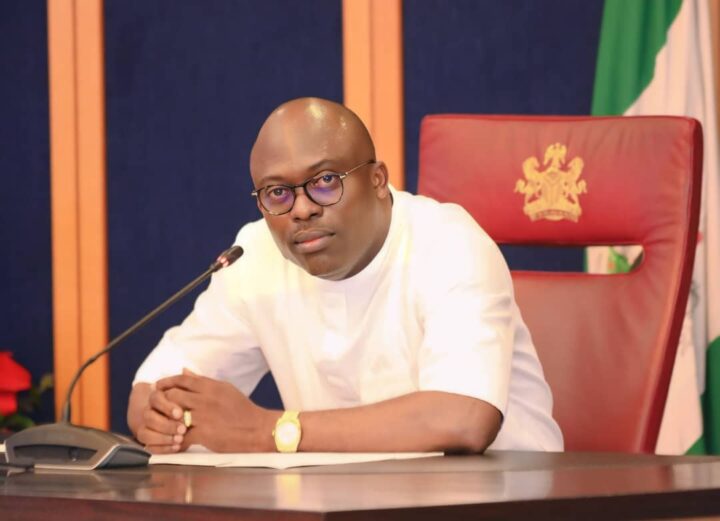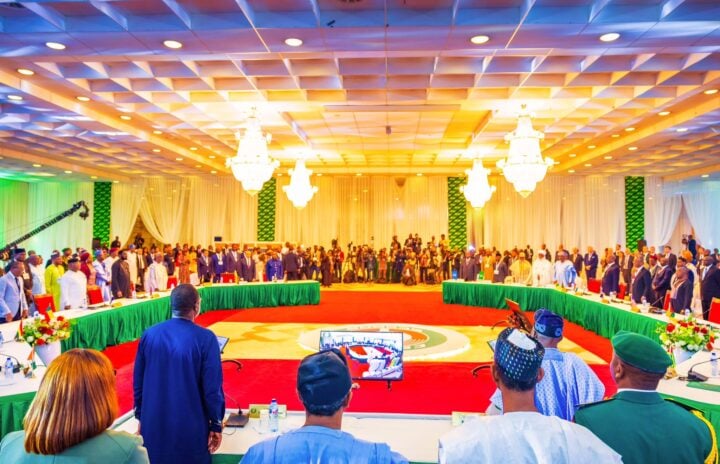Ekiti, Cross River, and Ogun states have proposed the suspension of their foreign debt repayments.
The proposal comes amid a severe foreign exchange (FX) volatility, which state officials claim has significantly hampered their ability to service existing debts.
According to minutes obtained by TheCable from the March 2024 meeting of the federal account allocation committee (FAAC), representatives from these states raised concerns about the rising cost of foreign loan repayments due to the weakening naira.
They said the cost of foreign debt servicing has drastically reduced their share of the federation account — a pool of funds distributed to states from the federal government revenue.
Advertisement
The FAAC minutes, which were adopted at the subsequent meeting held in April 2024, detailed the states’ arguments for a debt repayment suspension.
Akintunde Oyebode, Ekiti state commissioner of finance, said the financial strain caused by rising exchange rates has escalated the costs of foreign debt repayments.
According to Oyebode, the deductions from the statutory revenue for savings have also drastically reduced state balances.
Advertisement
He, therefore, advocated for an extensive discussion on exchange rates and multilateral financing to address the challenges.
“The HCF, Ekiti State, observed that there had been significant increases in the amounts deducted from the statutory revenue of the states for repayment of foreign loans due to the rising exchange rate,” the minutes read.
“Furthermore, he raised concerns on the amount deducted as savings from the revenue for the month, and noted that the balances of the sub-nationals had reduced tremendously as a result.”
His counterpart, Michael Odere, Cross River commissioner of finance, expressed fears about the state’s ability to fund capital projects due to reduced revenues.
Advertisement
Odere also proposed that pre-FAAC stakeholder meetings be arranged to better manage financial allocations during periods of fiscal shortfall.
“The HCF, Cross River State expressed fear that the states might not be able to fund capital projects as a result of reduction in revenue,” the minutes further read.
“He advised that in view of the tight financial situation of the Sub-nationals, some of the proposed deductions should be suspended including repayment for multilateral loans.
“He also advised that whenever the total distributable revenue was low, a pre-FAAC meeting should be arranged with stakeholders to have a discussion on ways to manage the situation.”
Advertisement
‘WE’RE DISCUSSING FX, INTEREST RATES ISSUES AT NEC’
Also speaking, Dapo Okubadejo, Ogun commissioner of finance, called for the redirection of the N200 billion previously earmarked as savings back into the federation account for redistribution among the states.
Advertisement
He also proposed a strong system that would effectively address these issues.
“The HCF, Ogun state, on his part, proposed that the N200 billion set aside as savings should be returned to the federation account for distribution to the beneficiaries,” the document reads.
Advertisement
“On the issue of multilateral financing, he proposed that a system should be put in place to effectively address issues associated with foreign exchange volatility.
“The HCF, Enugu State noted that if more funds were made available to states for infrastructural development, the revenue earnings of the states would increase.”
Advertisement
Responding to the issues raised, Wale Edun, minister of finance and chairperson of the meeting, disclosed that issues relating to the foreign exchange, interest rates and all aspects of the economy were being discussed at the national economic council (NEC).
He, therefore, advised members to forward their comments and concerns to NEC through their chief executives for consideration.
Edun also stressed the need for effective collaboration between the monetary and fiscal authorities to achieve the common goal of national development.
Add a comment







